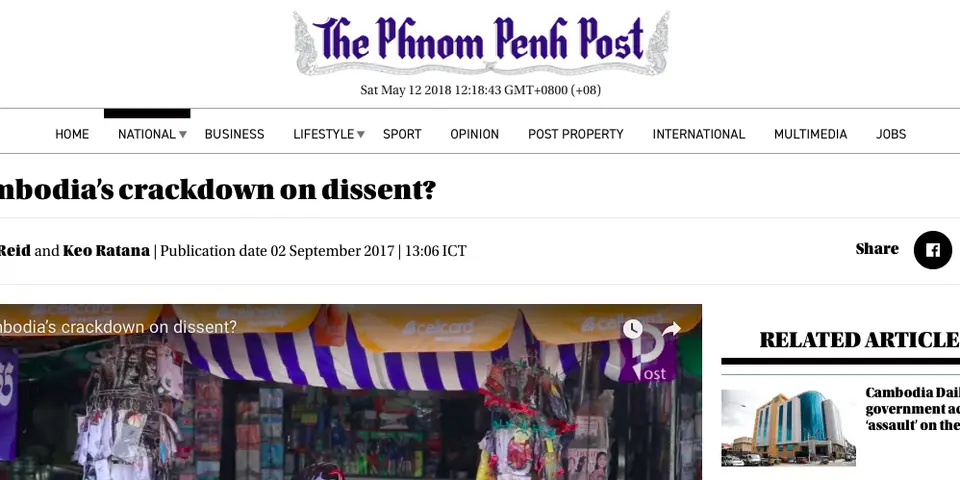
ASEAN MPs lament “end of press freedom” in Cambodia
May 09, 2018

JAKARTA – Regional lawmakers expressed grave concern today over the controversial buyout of The Phnom Penh Post, the last remaining independent newspaper in Cambodia, as they reiterated their calls for an immediate halt to the country’s continued authoritarian descent.
ASEAN Parliamentarians for Human Rights (APHR) said the development, which occurred just days before a 14 May deadline for parties to register for Cambodia’s upcoming national election, moved Cambodia further away from any potential for the election to be considered genuine.
“Having taken drastic steps to transform Cambodia into a de facto one-party state, it appears that Prime Minister Hun Sen believes that even one independent news outlet is too many and that only the complete end of press freedom in Cambodia can assure his reelection,” said APHR Chairperson Charles Santiago, a member of the Malaysian Parliament.
On 7 May, shortly after the announcement of the sale of The Phnom Penh Post to Malaysian businessman Sivakumar S. Ganapthy, the paper’s editor-in-chief, Kay Kimsong, was sacked for refusing to remove an article that detailed the purchase, including Ganapthy’s reported links to Cambodian Prime Minister Hun Sen. A number of other senior staff have also been relieved of their duties or resigned in protest since the sale. Prior to the buyout, The Phnom Penh Postwas facing a 3.9 million USD tax bill, which the sale has reportedly settled.
The purchase of the Post comes less than ten months after the forced closure of The Cambodia Daily, another independent newspaper, which was faced with similar pressure from the tax office, and the removal from the airwaves of independent radio programs, including Voice of America, Radio Free Asia, and Voice of Democracy.
“Based on how events have unfolded, the sale of The Phnom Penh Post appears to be part of an official effort to prevent the Cambodian people from hearing anything other than the government’s message. It is the continuation of an unrelenting assault on press freedom,” Santiago said.
The collapse of media freedom in Cambodia has come in the midst of an unprecedented crackdown on government criticism, which has included the dissolution of the main opposition party, the Cambodia National Rescue Party (CNRP), in November 2017 and the arrest in September 2017 of CNRP President Kem Sokha, whose continued detention has been declared arbitrary by the UN.
“The denial of the basic right to information runs counter to the very essence of a functioning democratic system. The demise of press freedom has gone hand in hand with the government’s refusal to allow the people of Cambodia to freely choose their leaders in a democratic election,” said Philippine Congressman and APHR member Tom Villarin.
Regional MPs expressed further alarm over statements from Prime Minister Hun Sen claiming that calls for an election boycott were illegal. On 4 May, the Prime Minister threatened to bring legal action against those, including former opposition leader Sam Rainsy, who appealed to voters not to cast ballots in the July election.
“Calling for a boycott is a legitimate exercise of freedom of expression. The freedom to choose one’s representative also includes the right to abstain from voting, particularly when conditions preclude the possibility of a genuine choice at the ballot box,” Villarin said.
On 30 April, the National Election Committee opened the registration process to political parties who intend to participate in the upcoming election, scheduled for 29 July. Registration closes on 14 May. APHR urged the Cambodian government to reinstate the CNRP prior to the 14 May deadline in order to rebuild public and international confidence in the legitimacy of the vote.
“Elections in Cambodia cannot be considered genuine without the reinstatement of the main opposition party and an end to the crackdown on independent media and critical voices,” Charles Santiago concluded.
ASEAN Parliamentarians for Human Rights (APHR) was founded in June 2013 with the objective of promoting democracy and human rights across Southeast Asia. Our founding members include many of the region's most progressive Members of Parliament (MPs), with a proven track record of human rights advocacy work.